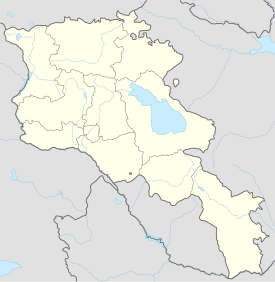Shoghakat
| Shoghakat Church | |
|---|---|

Shoghakat Church, August 2009
|
|
| Basic information | |
| Location | Vagharshapat, Armavir Province, Armenia |
| Geographic coordinates | 40°10′05″N 44°18′18″E / 40.168044°N 44.304936°ECoordinates: 40°10′05″N 44°18′18″E / 40.168044°N 44.304936°E |
| Affiliation | Armenian Apostolic Church |
| Architectural description | |
| Architectural type | Domed single nave basilica |
| Architectural style | Armenian |
| Completed | 1694 |
| Dome(s) | 1 |
| Official name: Cathedral and Churches of Echmiatsin and the Archaeological Site of Zvartnots | |
| Type | Cultural |
| Criteria | ii, iii |
| Designated | 2000 (24th session) |
| Reference no. | 1011 |
| Region | Western Asia |
The Church of Shoghakat (Armenian: Շողակաթ եկեղեցի; meaning "drop of light" because of the ray of light that came down from heaven upon Hripsimé's martyrs) was erected in 1694 by Prince Aghamal Sorotetsi during the reign of Catholicos Nahabed I in the city of Vagharshapat (Etchmiadzin), in Armenia's Armavir Province.
The church sits on the holy site where a group of unnamed nuns following Gayane and Hripsime were martyred during the time of the conversion of Armenia to Christianity in the year 301 AD. The 5th-century Armenian historian Agathangelos wrote that the young and beautiful Hripsime who at the time was a Christian nun in Rome, was to be forcefully married to the Roman emperor Diocletian. She and the abbess Gayane among other nuns fled the tyrant emperor and left to Armenia. The pagan Armenian King Trdat received a letter from Diocletian in which he described her beauty. Trdat discovered where the nuns were hiding, and fell in love with Hripsime and later Gayane. After their refusal of his advances, Hripsime and Gayane were tortured and martyred separately at the locations of the churches of their names. The remaining thirty-eight nuns were martyred at the location of Shoghakat. The name of the church refers to the ray of light that appeared during the martyrdom of the nuns. During the time that Hripsime was being tortured, Gayane had told her to "be of good cheer, and stand firm" in her faith. King Trdat was to be later converted to Christianity and made it the official religion of the kingdom.
At the site of the present day church of Shoghakat, there stood an earlier church of the 6th or 7th century which has not survived. It is believed that the structure standing at the site today possibly rests on the foundations of the earlier church (other sources say that Shoghakat may have been built upon the foundations of a 13th-century church). At the southwest end of the building, excavations uncovered the remains of a single-chamber church constructed on a stepped platform, thought to have been a 4th-century memorial chapel. At the southern wall is a small semi-circular apse believed to have served as a southern portico. The bases of the wall piers have features that are characteristic to 4th- and 5th-century Armenian churches. Two portals that led into the chapel were located as well, one to the south and one to the west.
...
Wikipedia

